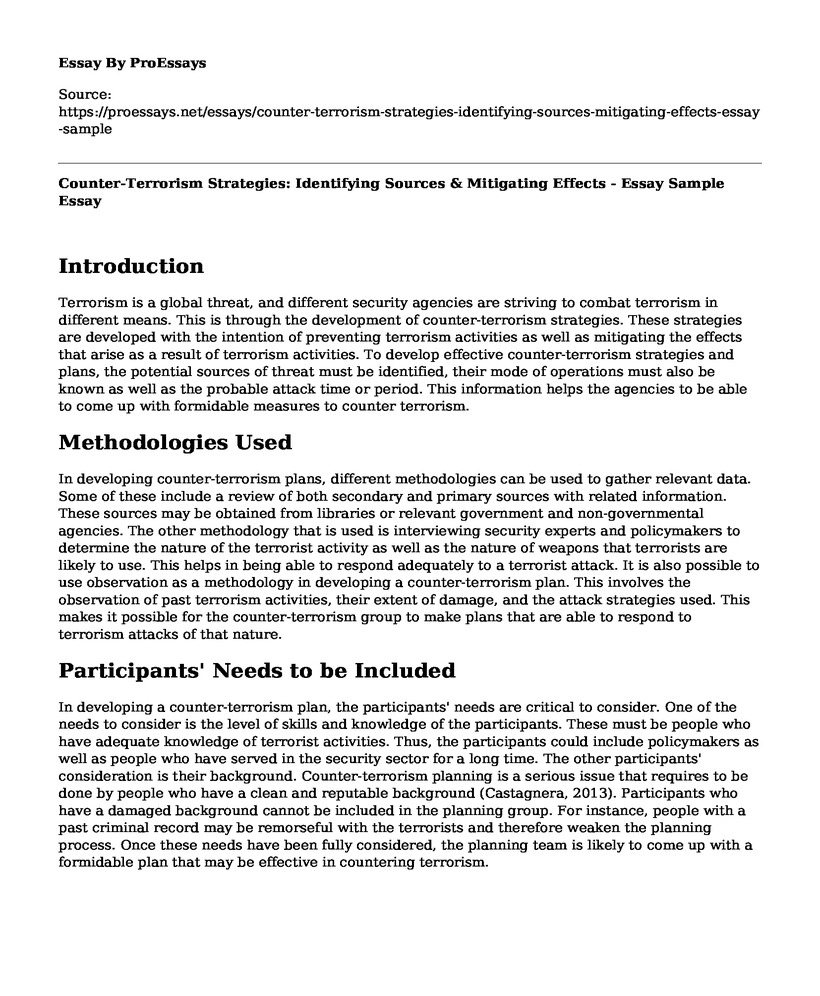Introduction
Terrorism is a global threat, and different security agencies are striving to combat terrorism in different means. This is through the development of counter-terrorism strategies. These strategies are developed with the intention of preventing terrorism activities as well as mitigating the effects that arise as a result of terrorism activities. To develop effective counter-terrorism strategies and plans, the potential sources of threat must be identified, their mode of operations must also be known as well as the probable attack time or period. This information helps the agencies to be able to come up with formidable measures to counter terrorism.
Methodologies Used
In developing counter-terrorism plans, different methodologies can be used to gather relevant data. Some of these include a review of both secondary and primary sources with related information. These sources may be obtained from libraries or relevant government and non-governmental agencies. The other methodology that is used is interviewing security experts and policymakers to determine the nature of the terrorist activity as well as the nature of weapons that terrorists are likely to use. This helps in being able to respond adequately to a terrorist attack. It is also possible to use observation as a methodology in developing a counter-terrorism plan. This involves the observation of past terrorism activities, their extent of damage, and the attack strategies used. This makes it possible for the counter-terrorism group to make plans that are able to respond to terrorism attacks of that nature.
Participants' Needs to be Included
In developing a counter-terrorism plan, the participants' needs are critical to consider. One of the needs to consider is the level of skills and knowledge of the participants. These must be people who have adequate knowledge of terrorist activities. Thus, the participants could include policymakers as well as people who have served in the security sector for a long time. The other participants' consideration is their background. Counter-terrorism planning is a serious issue that requires to be done by people who have a clean and reputable background (Castagnera, 2013). Participants who have a damaged background cannot be included in the planning group. For instance, people with a past criminal record may be remorseful with the terrorists and therefore weaken the planning process. Once these needs have been fully considered, the planning team is likely to come up with a formidable plan that may be effective in countering terrorism.
Impediments/ Roadblocks to Planning
One of the major impediments to planning is the lack of adequate funds to acquire everything that is required and facilitate all the processes involved. During the planning process, the participants need to hold several meetings that need to be funded (Motley, 2010). Besides, there is a need to purchase stationery and other survey materials that will be used in the planning processes. Thus, a lot of funds may be required for this process to go through. When the funds are not adequate, some stages stall affecting the overall delivery of the planning group.
The other impediment is a lack of essential intelligence about the terrorists. It is to be noted that terrorists are well organized and collect a lot of relevant information about a place before attacking. As such, it is necessary for the counter-terrorism team to gather as much information as possible about the terrorists. Some of this information may include a lack of the number of terrorists, the weapons they are likely to use, and also the areas that they intend to attack. This information is not easy to find, and sometimes, the planners may be unable to get adequate of this information, thus affecting their ability to plan properly.
Although unknown to many, time may be an impediment to the planning process. For the counter-terrorism team, planning is a race against time. It is all about making sure that plan is developed and executed even before the terrorists are able to cause any damage or attack. As the team plans, the terrorists are also planning. As such, it is upon the team to act with speed but without compromising on the quality of their planning. When the team does not have enough time to plan properly, it is always a limitation that may affect the success of the planners.
Conclusion
By and large, to curb terrorism requires a team of dedicated individuals who plan on countering any terrorist activity. Such teams need to acquire essential information about the terrorists and use it against the terrorists. With proper and adequate information, the team is likely to succeed in its mandate. However, if the team does not have adequate information about the terrorists, it may affect their success. The team also requires to gather as much information as possible to help in the planning process. Some of the sources include a review of both secondary and primary sources with related information. These sources may be obtained from libraries or relevant government and non-governmental agencies. Some of the roadblocks to proper planning may include time constraints and a lack of adequate funds.
References
Castagnera, J. O. (2013). Counter Terrorism Issues: Case Studies in the Courtroom. Bosa Roca: CRC Press.
Motley, J. B. (2010). US strategy to counter domestic political terrorism. Washington, D.C: National Defense University Press.
Cite this page
Counter-Terrorism Strategies: Identifying Sources & Mitigating Effects - Essay Sample. (2023, Jul 06). Retrieved from https://proessays.net/essays/counter-terrorism-strategies-identifying-sources-mitigating-effects-essay-sample
If you are the original author of this essay and no longer wish to have it published on the ProEssays website, please click below to request its removal:
- Paper Example on Thematic Concerns Featured During Malcolm's Time in The United States
- Film Analysis Essay on "Farm to Fridge"
- Pathways Between Bullying Victimization, Depression, Academic Achievement, and Problematic Drinking in Adolescence
- American Revolution: Women and Its Impact on Social Class - Essay Sample
- Essay Example on Child Abuse: Impacts on Mental Health
- Paper Example on Aggressive Drug War: Impact on African Americans
- Immigrant Workers: A Vital Part of the US Workforce Paper Example







